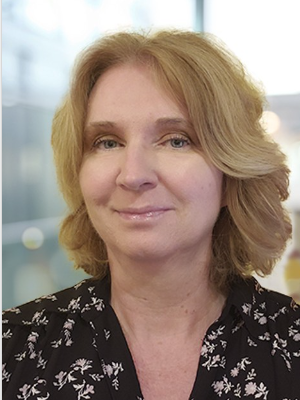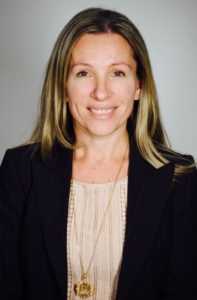 “You are motivated and grow when you are being challenged,” says Silke Soennecken, “when you have to use your resources to get your head around things you didn’t think would ever happen.”
“You are motivated and grow when you are being challenged,” says Silke Soennecken, “when you have to use your resources to get your head around things you didn’t think would ever happen.”
Soennecken speaks to growing through challenge, retaining your power as a woman and letting go for others to grow.
When Things Turn Upside-Down, Learning Curves Go Up
As a Managing Director at Commerzbank New York, Soennecken is tasked to oversee governance and strategy for all risk management in the region, and is responsible for the bank’s entire North American credit portfolio. Based at a branch rather than head office, she enjoys the vantage point of gleaning how initiatives flow and come together, while gaining insight into areas of risk management that interrelate with her expertise in corporate credit.
As a risk manager, she thinks that despite the challenge, it is precisely the unexpected and unprecedented moments that provide the strongest learning experiences and opportunities to grow your skillset.
She experienced this first-hand in September 2008, when she joined Commerzbank just one month before the financial world fell into crisis, and then again this past year with the pandemic. Now Soennecken approaches these big upheavals with some fascination by observing how various players respond and react to crisis on all levels.
She notes her “extremely analytical mind” gives her the ability to remain curious and agile, as she is naturally prone to dissecting how the many pieces of a system work together and interact with each other—including considering the consequences in a scenario when one piece fails.
Flipping the Worst-Case Scenario
Soennecken had a first-hand experience of a worst-case work challenge, when years ago, her firm initiated a significant restructuring. Consequently, she witnessed a mass exodus of her entire 25 person department over just a few months, including team members she thought she could not afford to lose.
Tasked with restructuring the department, and never imagining she would end up doing it alone, she recalls a “breakdown moment” in the bathroom after the last person announced they, too, were leaving. However, beginning with temporary patches, Soennecken stood up and began to rebuild the entire department.
Although she had a private office, she instead moved her desk to the middle of the open floor, where anyone who joined would have access to her. Only after a three-year journey rebuilding the team did she return to her office with an open door policy.
“Rebuilding was hitting rock bottom where there was nothing left, and then climbing out from there to create a completely new department,” she recalls. “I didn’t know what to do except to put myself right in the middle and build from the inside out. I was just put in charge and swam my way out. But when I look back, I’m proud of the approach I took, and of what I accomplished.”
For Soennecken, the most impactful part of this experience was learning via unsolicited team member feedback about how her collaborative approach positively impacted their individual and collective growth.
Staying Confident as A Woman
“I had the advantage that I found progressive male mentors that supported me,” says Soennecken, “but I also found a lot of opposition along the way for being a woman.”
Having worked in banking for a few decades, she remembers earlier in her career being the only woman in rooms of men where she was asked to pour the coffee. Though she recalls wondering ‘why her?’, the request wasn’t entirely out of the norm at the time, and she wasn’t equipped to confront it like women are today.
“I wasn’t entirely aware that I was sometimes being treated in a way I shouldn’t have been treated,” says Soennecken. “As a consequence, certain elements of confidence were lost along the way that I didn’t notice I was losing, until I look back now.”
Today, she can recognize the minimizing ways in which she was talked to or handled as a woman, and how that wore down her natural confidence, while other habits arose to compensate and created a double bind.
“I ended up being a little harder than I was expected to be. I even had a coach for supposedly being too straightforward when talking to people,” she says, “but I think it was, in part, a consequence of navigating through a world where I had to push with my elbows to try to be heard. Now I know that I could have used a more feminine approach to get what I wanted without having to try to act like a man.”
In retrospect, Soennecken observed she could have used her intuitive and relational skills—such as sensing someone’s feelings about confrontation or mirroring their conversational tendencies—to achieve the influence she instead struggled for.
“Our sensitivity as women can work against us, but I realize I could have used that sensitivity to my advantage in interrelating,” she reflects. “It would have spared me some stress along the way.”
The Danger of Over-Explaining
Soennecken believes that it is important to encourage gender diversity in managerial roles, but on the flip side, women need not be required to champion every woman when it’s more objectivity that is needed.
When asked, one way she’s personally observed how women can undermine their own power is by defending themselves too much in the meeting room.
“We often think we are being attacked personally,” she says, noting many moments when she’s listened to another woman get drawn into over-explaining herself, going further only to lose her ground.
“If you make yourself small by defending yourself too much, by giving a lot of explanation for something that could be a simple answer,” she continues, ”then you lose all your power and the advantage you might have had.”
‘Letting Go’ For Others to Grow
Over the years, Soennecken has adapted from guiding people with a hands-on approach, to guiding people while letting go.
“When you are hands on, you do things a certain way and tend to believe others should do it the same way. But people have different approaches, and it takes time to admit to yourself those approaches are fine, and so are the consequences,” she says. “You are supporting the growth of people by allowing them to also make mistakes. You’re going to support and guide them, but there’s purpose in delegating and giving others the opportunity to grow and shine in their own way.”
As a mentor, she notices when people are stuck: “You see that someone is in the wrong job, but they are afraid of changing, finding the right job and really being happy. They’re making a big effort, but they can’t grow because it’s not what they want to do.”
“The potential is in embracing the unknown, not in staying in their comfort zone, but you get a lot of resistance because most people don’t like change. The success story happens when finally somebody embraces the change that is good for them,” she says. “You can help them realize the potential is there, and trust and support them, but they have to ultimately make the decision.”
When it comes to finding fulfillment at work and advancing up the career ladder, Soennecken feels it’s about going beyond. Being interested and doing “the extra” is what creates the sense of fulfillment for her.
“If you come to work every day and you type five pages because your job is to type five pages, you’re not going to progress,” she gives as an example. “But if you come in every day, and instead of typing five pages, one day you decide the pages could be a different color or a different layout or you can type eight pages or a book, then you grow.”
Never Forget “The Little Heart”
“You cannot have a more loyal employee than if the person has a personal situation, and you show you can be supportive,” says Soennecken. “Never forget about the personal side of the people you work with. It’s what I call ‘the little heart’ and everybody has ‘a little heart’. Very often, I think about ‘the little heart’ of my colleagues, regardless of their role or responsibility.”
When it comes to non-business workplace issues, for example redesigning seating arrangements, she knows certain things are important to people, and if she can accommodate a request, she will. While you can’t please everyone, she has found it makes all the difference to thoughtfully consider all parts of someone in the decisions she makes.
Speaking of little hearts, Soenneken is the single mother of two bright, energetic twin six-year-old girls. She feels the pandemic has helped to highlight what is most important in life and is enjoying the unexpected, but welcome, togetherness with her family.
By Aimee Hansen

